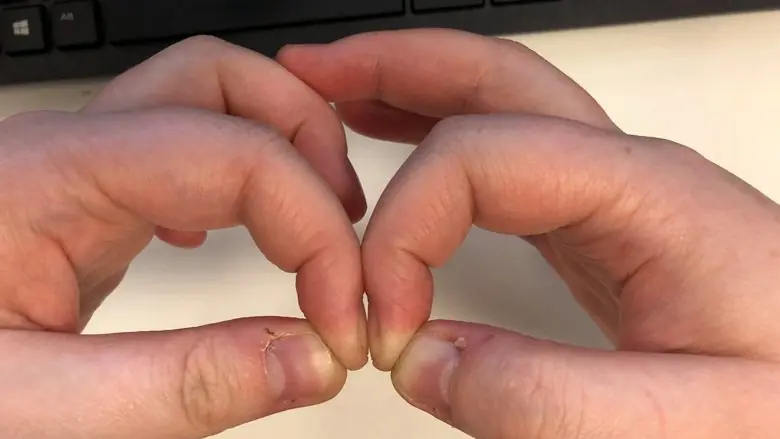
Revolutionary C@ncer Treatment: Doctors Target Tumors Without Chemotherapy
A groundbreaking study has demonstrated that certain cancers can be effectively treated using immunotherapy alone, eliminating the need for traditional chemotherapy or surgery. This advancement offers new hope for patients with specific genetic mutations, potentially transforming cancer treatment paradigms.
Introduction:
In a pioneering clinical trial, researchers at Memorial Sloan Kettering Cancer Center have shown that immunotherapy can successfully treat certain cancers without the need for chemotherapy or surgery. The study, published in The New England Journal of Medicine, involved 103 patients with mismatch repair-deficient (MMRd) tumors, a genetic mutation that makes cancers more susceptible to immune system attacks.
Study Details:
The trial administered the checkpoint inhibitor dostarlimab to patients with various cancers, including rectal, stomach, endometrial, and prostate cancers. Remarkably, 92% of patients remained cancer-free for at least two years after treatment. Among rectal cancer patients, all 49 experienced complete remission, with no detectable signs of cancer post-treatment. For patients with other cancers, 35 out of 54 achieved complete remission, and nearly two-thirds preserved their organs and quality of life without undergoing surgery or chemotherapy.
Mechanism of Action:
Dostarlimab works by blocking checkpoint proteins that prevent the immune system from attacking cancer cells. By inhibiting these proteins, the drug enables the body's T-cells to recognize and destroy cancer cells more effectively. This approach is particularly effective in patients with MMRd tumors, which are characterized by defects in the DNA repair mechanism, leading to an accumulation of mutations that make the cancer cells more visible to the immune system.
Implications for Treatment:
This breakthrough has significant implications for cancer treatment. Traditional cancer therapies, such as chemotherapy and surgery, often come with severe side effects and can impact the patient's quality of life. By utilizing immunotherapy alone, patients may avoid these harsh treatments while still achieving effective cancer control. Moreover, the ability to preserve organs and bodily functions is a significant advantage, especially for cancers like rectal cancer, where traditional treatments can lead to permanent changes in bowel and urinary function.
Limitations and Future Directions:
While the results are promising, the treatment is currently effective only for patients with MMRd tumors. This mutation is present in a subset of cancers, including colorectal, endometrial, and some other gastrointestinal cancers. Researchers are now focusing on understanding why rectal tissue responds so well to immunotherapy and how this knowledge can be applied to other cancer types. Additionally, ongoing studies aim to combine dostarlimab with other immunotherapeutic agents to broaden its applicability and enhance its effectiveness.
Conclusion:
The success of this study marks a significant step forward in cancer treatment, offering a less invasive and potentially more effective alternative to traditional therapies. As research continues, there is hope that this approach can be extended to a broader range of cancers, providing patients with more treatment options and improved outcomes.
News in the same category


A couple was both diagnosed with lung cancer, leaving the doctor stunned: "What exactly happened in this house?" It turns out the cause came from here.

Long vs. Round Eggplants: Which One Should You Choose?

Restore Your Grout Lines with This Easy and Budget-Friendly DIY Cleaning Hack

12-Year-Old's Lifelong Dialysis: 5 Favorite Foods Secretly Damaging Your Kidneys

Eating While Screen-Obsessed? Here Are 4 Hidden Health Risks You’re Ignoring

How to Choose the Sweetest Pineapple: Long Leaves or Short?

8 Simple Yet Highly Effective Tips to Stop Snoring

Is It Necessary to Unplug Your Washing Machine After Use

The Hidden Costs of Frost Accumulation in Your Refrigerator: Understanding the Energy Drai

🍎 Why Do Imported Apples Stay Fresh for a Month Without Spoiling?

Top 3 Seat Positions with the Highest Survival Rates in Aviation Emergencie

Simple Finger Test Could Reveal Early Signs of Lung C@ncer and Other Health Issues
A simple finger test, known as the Schamroth window test, can help detect signs of lung c@ncer and other health conditions, including heart problems. Learn how to perform this easy test at home.

Start Your Day Right: 5 Foods That Safeguard Your Kidneys and Reduce Uric Acid

The Ultimate Health Blend: Honey, Cinnamon, Turmeric, Apple Cider Vinegar, and Chia Seeds for Better Health
Discover the powerful benefits of honey, cinnamon, turmeric, apple cider vinegar, and chia seeds. Learn how this natural blend can improve digestion, stabilize blood sugar, and enhance bone and heart health.

Why Your Underwear Gets Bleach-Like Stains: Gynecologist Explains the Causes and What It Means for Your Health
Discover why your underwear may have bleach-like stains and why it's completely normal. A gynecologist explains the role of vag!nal discharge and how it can affect your underwear fabric. Learn when to be concerned and how to maintain vag!nal health.

12 Effective Ways to Remove a Wart on Your Finger
Discover effective methods for removing warts on your fingers, from at-home remedies like salicylic acid and duct tape to professional treatments. Learn how to identify, treat, and prevent warts with expert advice.

5 Household Items That Harbor Formaldehyde: Hidden Cancer Risks Lurking in Your Home

Air Conditioner Efficiency: Continuous Use vs. Frequent Switching
News Post

Effective Natural Remedy to Reverse Grey Hair and Prevent Future Greying
The onion juice, black seed powder, and henna remedy offers a safe, effective, and affordable way to address grey hair and improve overall hair health.

Garlic Oil for Hair Growth: The Ultimate DIY Hair Treatment for Stronger, Healthier, and Thicker Hair
Garlic oil is a powerful, natural remedy for various hair concerns. Its ability to promote hair growth, reduce dandruff, and strengthen hair makes it an excellent addition to your hair care routine.

Strawberries and Baking Soda for Teeth Whitening: Myth or Miracle? Exploring Natural Alternatives for a Brighter Smile
The potential risks of enamel erosion and the limited whitening power make this DIY remedy a less-than-ideal choice for those looking for long-term, safe, and effective results.

DIY Natural Body Whitening Bath Powders: 4 Effective Recipes for Glowing, Smooth Skin
These simple recipes use natural ingredients that are easily accessible and provide multiple skin benefits, including brightening, exfoliating, and nourishing.

A Family of Three Diagnoses with Liver C@ncer, Doctor Furious as He "Accuses" Two Foods in the Fridge as the Culprits

A couple was both diagnosed with lung cancer, leaving the doctor stunned: "What exactly happened in this house?" It turns out the cause came from here.

Beyond the BuII!e$: How One Girl Stitched Her Way Back to Confidence with Crochet
After facing buIIy!ng for her unique style, a 6th-grade girl found her voice and confidence again through crochet. Discover this inspiring story of artistic triumph, self-expression, and how handmade passion can build an empire, one stitch at a time.

Long vs. Round Eggplants: Which One Should You Choose?

The Heartbre@king Selfie: A Dream Shattered in the Blink of an Eye
On June 12, a family’s dream of a new life in London ended tragically in a plane crash. Discover the emotional story of Pratik Joshi’s family, their dreams, and the reminder that life is fragile.

Restore Your Grout Lines with This Easy and Budget-Friendly DIY Cleaning Hack

12-Year-Old's Lifelong Dialysis: 5 Favorite Foods Secretly Damaging Your Kidneys

5 DIY Skin Toners for Radiant, Smooth Skin: Natural Remedies for Every Skin Type
By incorporating these simple DIY toners into your daily skincare regimen, you can achieve smoother, clearer, and more radiant skin without the need for expensive products.

Eating While Screen-Obsessed? Here Are 4 Hidden Health Risks You’re Ignoring

Should You Stay or Let Go? How I Realized I Wasn't His First Choice
A heartfelt and emotional journey of love, heartbreak, and self-discovery. When your partner is still hung up on their ex, is it worth fighting for the relationship? Discover the painful truth behind choosing yourself over unrequited love.

Vaseline and Coffee: The Ultimate DIY Skincare Duo to Achieve Wrinkle-Free Skin Naturally
By incorporating these ingredients into your skincare routine through DIY masks and scrubs, you can rejuvenate your skin, reduce the appearance of wrinkles, and achieve a youthful, radiant complexion.

The Flowers that Kept Us Apart: A Love Story Decades in the Making
A woman embarks on a journey to find out the truth behind mysterious flowers sent to her every year, only to uncover a love story that had been hidden for 20 years.

I Found My Husband's Secret Conversations With Another Woman – And What He Told Me Br0ke My Heart
A wife discovers her husband's secret texts with a woman he met at a strip club. What seemed like innocent conversations quickly turns into an affair, and now she has to decide if she can ever trust him again.

Weight Loss Drink: Consume These 2 Herbal Drinks To Detox and Lose Weight Naturally
These two natural detox drinks-Spiced Lemon-Honey Drink and Cumin Water-are simple yet powerful remedies for boosting metabolism, improving digestion, and reducing belly fat.

How to Choose the Sweetest Pineapple: Long Leaves or Short?

Abandoned Child, Heartbre@king Note, and the Sh0cking Truth Behind a Family's Dark Secret
When a woman discovers an abandoned child with a mysterious note, she’s thrust into a tangled web of secrets, betrayal, and an inheritance that changes everything. Dive into this captivating story of hidden truths and the love that saves a life.